- Home
- André Aciman
Eight White Nights
Eight White Nights Read online
ALSO BY ANDRÉ ACIMAN
FICTION
Call Me by Your Name
NONFICTION
The Light of New York (with Jean-Michel Berts)
Out of Egypt: A Memoir
False Papers: Essays on Exile and Memory
Entrez: Signs of France (with Steven Rothfeld)
AS EDITOR
The Proust Project
Letters of Transit: Reflections on Exile, Identity, Language, and Loss
EIGHT WHITE NIGHTS
EIGHT WHITE NIGHTS
André Aciman
FARRAR, STRAUS AND GIROUX NEW YORK
Farrar, Straus and Giroux
18 West 18th Street, New York 10011
Copyright © 2010 by André Aciman
All rights reserved
Distributed in Canada by D&M Publishers, Inc.
Printed in the United States of America
First edition, 2010
Library of Congress Cataloging-in-Publication Data
Aciman, André.
Eight white nights / André Aciman. — 1st ed.
p. cm.
ISBN 978-0-374-22842-2 (hardcover: alk. paper)
I. Title.
PS3601.C525 E54 2010
813'.6—dc22
2009025415
Designed by Jonathan D. Lippincott
www.fsgbooks.com
1 3 5 7 9 10 8 6 4 2
I wish to thank Paul LeClerc, who gave me courage when I needed it most; the New York Public Library’s Dorothy and Lewis B. Cullman Center for Scholars and Writers, for giving me a study for a whole year; Yaddo, for housing me during two glorious Junes; Jonathan Galassi, my editor; Lynn Nesbit, my agent; Cynthia Zarin, my friend—all of whom gave so much to this book. And, finally, my wife, Susan, who gave me roots, a home, a life, and all the love and blessings of family.
For Philip,
luz y dulzura
FIRST NIGHT
Halfway through dinner, I knew I’d replay the whole evening in reverse—the bus, the snow, the walk up the tiny incline, the cathedral looming straight before me, the stranger in the elevator, the crowded large living room where candlelit faces beamed with laughter and premonition, the piano music, the singer with the throaty voice, the scent of pinewood everywhere as I wandered from room to room, thinking that perhaps I should have arrived much earlier tonight, or a bit later, or that I shouldn’t have come at all, the classic sepia etchings on the wall by the bathroom where a swinging door opened to a long corridor to private areas not intended for guests but took another turn toward the hallway and then, by miracle, led back into the same living room, where more people had gathered, and where, turning to me by the window where I thought I’d found a quiet spot behind the large Christmas tree, someone suddenly put out a hand and said, “I am Clara.”
I am Clara, delivered in a flash, as the most obvious fact in the world, as though I’d known it all along, or should have known it, and, seeing I hadn’t acknowledged her, or perhaps was trying not to, she’d help me stop the pretense and put a face to a name everyone had surely mentioned many times before.
In someone else, I am Clara would have sprung like a tentative conversation opener—meek, seemingly assertive, overly casual, distant, aired as an afterthought, the verbal equivalent of a handshake that has learned to convey firmness and vigor by overexerting an otherwise limp and lifeless grip. In a shy person, I am Clara would require so much effort that it might leave her drained and almost grateful when you failed to pick up the cue.
Here, I am Clara was neither bold nor intrusive, but spoken with the practiced, wry smile of someone who had said it too many times to care how it broke the silence with strangers. Strained, indifferent, weary, and amused—at herself, at me, at life for making introductions the tense, self-conscious things they are—it slipped between us like a meaningless formality that had to be gotten over with, and now was as good a time as any, seeing that the two of us were standing away from those who had gathered in the middle of the room and who were about to start singing. Her words sprung on me like one of those gusts that clear through obstacles and throw open all doors and windows, trailing April blossom in the heart of a winter month, stirring everything along their path with the hasty familiarity of people who, when it comes to other people, couldn’t care less and haven’t a thing to lose. She wasn’t bustling in nor was she skipping over tedious steps, but there was a touch of crisis and commotion in her three words that wasn’t unwelcome or totally unintended. It suited her figure, the darting arrogance of her chin, of the voile-thin crimson shirt which she wore unbuttoned to her breastbone, the swell of skin as smooth and forbidding as the diamond stud on her thin platinum necklace.
I am Clara. It barged in unannounced, like a spectator squeezing into a packed auditorium seconds before curtain time, disturbing everyone, and yet so clearly amused by the stir she causes that, no sooner she’s found the seat that will be hers for the rest of the season than she’ll remove her coat, slip it around her shoulders, turn to her new neighbor, and, meaning to apologize for the disruption without making too much of it, whisper a conspiring “I am Clara.” It meant, I’m the Clara you’ll be seeing all year long here, so let’s just make the best of it. I am the Clara you never thought would be sitting right next to you, and yet here I am. I’m the Clara you’ll wish to find here every one day of every month for the remainder of this and every other year of your life—and I know it, and let’s face it, much as you’re trying not to show it, you knew it the moment you set eyes on me. I am Clara.
It was a cross between a ribbing “How couldn’t you know?” and “What’s with the face?” “Here,” she seemed to say, like a magician about to teach a child a simple trick, “take this name and hold it tight in your palm, and when you’re home alone, open your hand and think, Today I met Clara.” It was like offering an elderly gentleman a chocolate-hazelnut square just when he was about to lose his temper. “Don’t say anything until you’ve bitten into it.” She jostled you, but instantly made up for it before you’d even felt it, so that it wasn’t clear which had come first, the apology or the little jab, or whether both weren’t braided in the same gesture, spiraling around her three words like frisky death threats masquerading as meaningless pranks. I am Clara.
Life before. Life after.
Everything before Clara seemed so lifeless, hollow, stopgap. The after-Clara thrilled and scared me, a mirage of water beyond a valley of rattlesnakes.
I am Clara. It was the one thing I knew best and could always come back to each time I’d want to think of her—alert, warm, caustic, and dangerous. Everything about her radiated from these three words, as though they were a pressing bulletin mysteriously scribbled on the back of a matchbook that you slip into a wallet because it will always summon an evening when a dream, a would-be life, suddenly blossomed before you. It could be just that, a dream and nothing more, but it stirred so fierce a desire to be happy that I was almost ready to believe I was indeed happy on the evening when someone blustered in, trailing April blossom in the heart of a winter month.
Would I still feel this way on leaving the party tonight? Or would I find cunning ways to latch on to minor defects so that they’d start to bother me and allow me to snuff the dream till it tapered off and lost its luster and, with its luster gone, remind me once again, as ever again, that happiness is the one thing in our lives others cannot bring.
I am Clara. It conjured her voice, her smile, her face when she vanished into the crowd that night and made me fear I’d already lost her, imagined her. “I am Clara,” I’d say to myself, and she was Clara all over again, standing near me by the Christmas tree, alert, warm, caustic, and dangerous.
I was—and I knew it within minutes of meeting he
r—already rehearsing never seeing her again, already wondering how to take I am Clara with me tonight and stow it in a drawer along with my cuff links, collar stays, my watch and money clip.
I was learning to disbelieve that this could last another five minutes, because this had all the makings of an unreal, spellbound interlude, when things open up far too easily and seem willing to let us into the otherwise closed circle that is none other than our very own life, our life as we’ve always craved to live it but cheat it at each turn, our life finally transposed in the right key, retold in the right tense, in a language that speaks to us and is right for us and us alone, our life finally made real and luminous because it’s revealed, not in ours, but in someone else’s voice, grasped from another’s hand, caught on the face of someone who couldn’t possibly be a stranger, but, because she is nothing but a stranger, holds our eyes with a gaze that says, Tonight I’m the face you put on your life and how you live it. Tonight, I am your eyes to the world looking back at you. I am Clara.
It meant: Take my name and whisper it to yourself, and in a week’s time come back to it and see if crystals haven’t sprouted around it.
I am Clara—she had smiled, as though she’d been laughing at something someone had just said to her and, borrowing the mirth started in another context, had turned to me behind the Christmas tree and told me her name, given me her hand, and made me want to laugh at punch lines I hadn’t heard but whose drift corresponded to a sense of humor that was exactly like mine.
This is what I am Clara meant to me. It created the illusion of intimacy, of a friendship briefly interrupted and urgently resumed, as though we’d met before, or had crossed each other’s path but kept missing each other and were being reintroduced at all costs now, so that in extending her hand to me, she was doing something we should have done much sooner, seeing we had grown up together and lost touch, or been through so much, perhaps been lovers a lifetime ago, until something as trivial and shameful as death had come between us and which, this time, she wasn’t about to let happen.
I am Clara meant I already know you—this is no ordinary business—and if you think fate doesn’t have a hand in this, think twice. We could, if you wish, stick to ordinary cocktail pleasantries and pretend this is all in your head, or we can drop everything, pay attention to no one, and, like children building a tiny tent in the middle of a crowded living room on Christmas Eve, enter a world beaming with laughter and premonition, where everything is without peril, where there’s no place for shame, doubt, or fear, and where all is said in jest and in whimsy, because the things that are most solemn often come under the guise of mischief and merrymaking.
•
I held her hand a touch longer than is usual, to say I had gotten the message, but let it go sooner than warranted, fearing I’d invented the message.
That was my contribution, my signature to the evening, my twisted reading of a plain handshake. If she knew how to read me, she’d see through this affectation of nonchalance and catch the other, deeper nonchalance, which I am reluctant to dispel especially in the presence of someone who, with three words and barely a glance, could easily hold the key to all my hideaways.
It did not occur to me that people who bolt into your life could as easily bolt out of it when they’re done, that someone who breaks into a concert hall seconds before the music starts may all of a sudden stand up and disturb everyone all over again on realizing she is sitting in the wrong row and doesn’t care to wait until the intermission.
I looked at her. I looked at her face. I knew that face. “You look familiar,” I was going to say.
“You look lost,” she said.
“Does it show?” I answered. “Don’t most people look lost at parties?”
“Some more than others. Not him.” She pointed at a middle-aged gentleman talking with a woman. He was leaning against what must have been a false, chamfered pillar with a Corinthian-style topstone, holding a clear drink in his hand, almost slouching against the pillar as though he had all the time in the world. “Doesn’t look lost at all. Neither does she.”
I am Clara. I see through people.
Mr. and Mrs. Shukoff, she baptized them; Mr. and Mrs. Shukoff couldn’t wait to rip their clothes off, he said with a wink as he gulped down his drink, give me a second and I’m ready for blastoff.
Shukoff: people you couldn’t shake off but wished you could, she explained. We laughed.
Then, in a manner that couldn’t have been less discreet, Clara indicated a sixty-something woman who was wearing a long red dress with black patent-leather pumps. “Santa Claus’s grandmother. Just look at that,” she said, pointing to a wide, gold-buckled, patent-leather belt strapping Grandma’s tummy. She wore what must have been a sparkling blond wig whose sides, matted and hardened like two baby boar horns, curled around her ears. From her earlobes dangled two sliced large pearls mounted on tiny gold plates—miniature UFOs without the little green men, she said. Clara instantly baptized her Muffy Mitford. Then proceeded to demolish Muffy Mitford, enlisting me in the process, as though she never doubted I would join in the character assassination.
Muffy spoke with a warble in her voice. Muffy wore light blue shaggy froufrou slippers at home, I said. Muffy wore a housedress underneath, always a housedress underneath, she said. Muffy had an unshorn poodle named Suleiman. And a husband nicknamed Chip. And her son—what else—Pip. And her daughter, Mimi. No, Buffy, rhymes with Muffy. Muffy Beaumont. Née Montebello. No, Belmont. Let’s face it, Schoenberg, said Clara. Muffy had an English housemaid. From Shropshire. No, Nottingham. No, East Anglia. East Coker. Little Gidding, I said. Burnt Norton, she corrected, and, on second thought, from the Islands. Majorca, she said. With a name like Monserrat, I said. “No, no. Dolores Luz Berta Fatima Consuelo Jacinta Fabiola Inez Esmeralda”—one of those names that never end, because their magic lies in their lilt and cadence as they soar and surge and finally come cascading on a surname as common as the sand on the beaches of Far Rockaway: Rodriguez—which sent us roaring as we saw Muffy laugh and agitate her hips to the rhythm of the singer with the throaty voice, jiggling the limp end of her belt like a fertility symbol dangling from her midriff, her martini glass all empty—and she said with a wink as she gulped down her drink, pour me another and watch me turn pink.
“You’re a friend of Hans’s, aren’t you?” she asked.
“Why—how can you tell?”
“You’re not singing. I’m not singing.” Then, seeing I hadn’t quite seized her explanation, she added, “Friends of Hans don’t sing. Only Gretchen’s friends sing.” She wiped her lips with a napkin, as though to stifle the last flutters of a private joke she wasn’t about to share but whose ripples you weren’t meant to miss. “Simple,” she said, pointing not so discreetly to those gathered around the piano, where a crowd was singing away exuberantly around the man with the throaty voice.
“Gretchen must be the more musical of the two, then,” I added non-committally, just to say something, anything, even if it limped its way to unavoidable silence. Clara’s reply took the wind out of my words. “Gretchen, musical? Gretchen wouldn’t know music if it farted in her ears. Just look at her, nailed to the back of the door, greeting all her guests because she doesn’t know what else to do with herself.” I suddenly remembered the lame handshake, the perfunctory greeting, the kiss on the cheek that grazes your ear so as not to smear her makeup.
The words startled me, but I let them pass, not knowing how to answer or counter them. “Just look at their faces, though,” she threw in, pointing at the singers. I looked at their faces. “Would you sing simply because it’s a Christmas party and everyone’s yuling about like overgrown goldfish sucking on eggnog?”
I said nothing.
“Seriously,” she added—so this wasn’t a rhetorical question. “Just look at all these Euro Shukoffs. Don’t they all look like people who always sing at Christmas parties?”
I am Clara. I get nasty.
“But I sing—sometime
s,” I threw in disingenuously, trying to sound no less bland or naive than those who thought it was the most natural thing in the world to sing at parties. Perhaps I wanted to see how she’d take back her hostility, now that she had inadvertently caught me in its fire. Or perhaps I was just teasing her and didn’t want her to know how much her cynical assessment of sing-along fellowship echoed my own.
“But I sing,” she said, arching an eyebrow as though I’d said something complex and difficult. She nodded somewhat as she pondered the deeper meaning of my words, and still seemed to be weighing them, when it suddenly hit me: she wasn’t talking about herself; she was mimicking what I had just said to her—But I sing—and was throwing it back at me with the taunting lilt of derision, like a crumpled gift being returned in its now dented box.
“So you sing,” she said, still considering the matter. Or was she already backpedaling after her poisoned dart?
“Yes. I sing, sometimes—” I replied, trying not to sound too smug or too earnest. I pretended I hadn’t picked up on the goading irony in her voice and was about to add “in the shower”—but immediately sensed that, in Clara’s universe, singing in the shower was precisely what everyone confessed to when they cagily admitted that they liked to sing sometimes. It would have been such a predictable thing to say. I could already hear her unstitching every cliché in my sentence.
“So you sing,” she started. “Let’s hear you, then.”
I was caught off guard. I shook my head.
“Why? Doesn’t sing well with others?” she asked.
“—something like that.” Could do better was a lame repartee to her report-card banter, which is why I suppressed it. But now I had nothing else to say.
Another moment of hesitation. Then, looking over my shoulder, she broke the silence: “Want to hear me sing?”

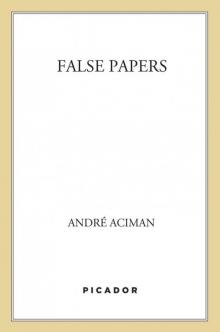 False Papers
False Papers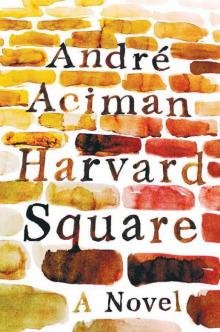 Harvard Square
Harvard Square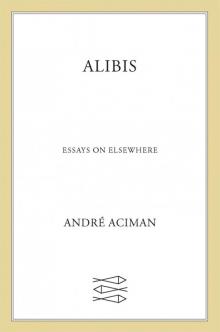 Alibis
Alibis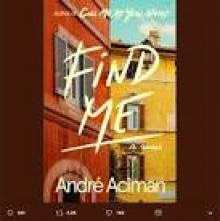 Find Me
Find Me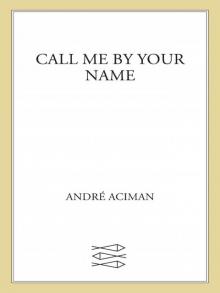 Call Me by Your Name
Call Me by Your Name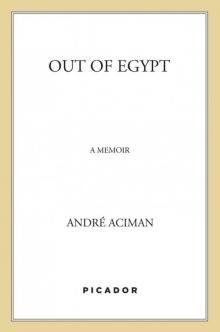 Out of Egypt: A Memoir
Out of Egypt: A Memoir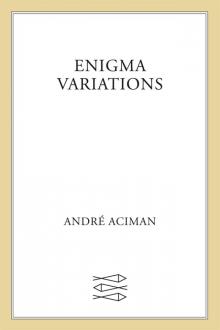 Enigma Variations
Enigma Variations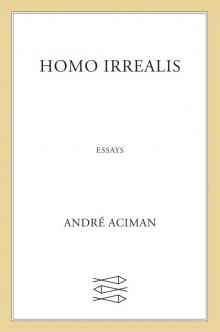 Homo Irrealis
Homo Irrealis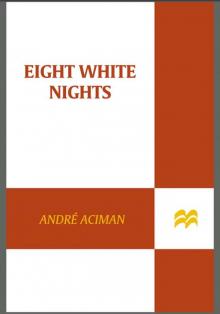 Eight White Nights
Eight White Nights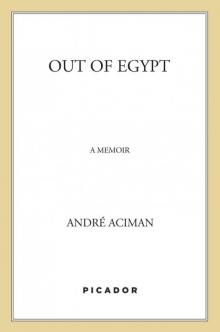 Out of Egypt
Out of Egypt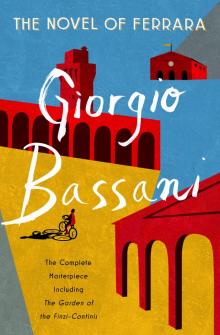 The Novel of Ferrara
The Novel of Ferrara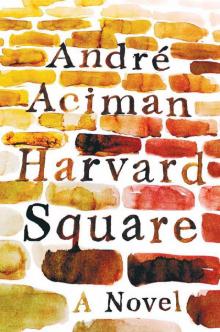 Harvard Square: A Novel
Harvard Square: A Novel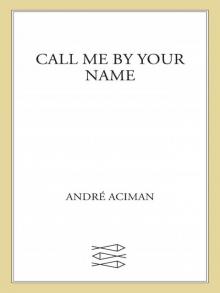 Call Me by Your Name: A Novel
Call Me by Your Name: A Novel